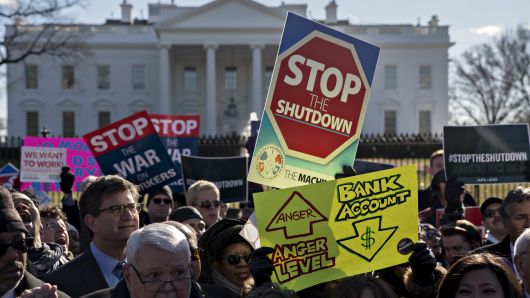Opinion: Trump’s Shutdown is Abhorrent and Disingenuous
With partisanship at its heart, a four week government shutdown says a lot.

Photo courtesy of CNBC
Demonstrators protest the federal government shutdown.
Over the course of the past two and a half years, I’ve been outraged about a lot of things. I’ve been outraged that the media coverage of Clinton focused on her email scandal and not her qualifications or policies. I’ve been outraged that Trump bragged about sexual assault – and then won the election. I’ve been outraged that Trump obstructed justice by firing James Comey. I’ve been outraged with Trump’s undermining of the free press by continuously declaring the media the enemy of the people. I’ve been outraged that truth no longer seems important. I’ve been outraged that Trump tried to end DACA. That he claimed that there were fine people marching as white supremacists in Charlottesville, VA. That he enacted policies to separate children from their families and put them in cages. The point is, I’ve spent so much time outraged that, at times, I’ve felt numb to it.
But the current government shutdown – the longest in American history – feels different. The past three weeks have challenged and annihilated any of that numbness. I am outraged not only at the evil of the shutdown – as I am with everything on the list above – but at the complete lack of factual basis for the Republican stance. Trump’s premise is so outlandish that, if taken at face value, it seems simply stupid. When coupled with the danger of this shutdown for both federal employees and presidential precedent, it is what I believe to be one of the most reprehensible undertakings of the Trump administration.
To understand this shutdown, let’s back up to the 2016 presidential race, when Trump ran on the campaign promise of building a wall to prevent illegal immigration along the Mexican-American border. Mexico, he falsely claimed, would pay for this wall. In making “The Wall” the center of his campaign, Trump made many Americans believe that their safety was at risk. More crucially, he made them believe that his wall would eliminate that risk.
The Wall became more than a supposed policy goal, though. It became a uniting cry for Trump’s base, prevalent as a chant at his rallies and a hashtag on Twitter. The Wall became a symbol of Trump. He campaigned on the promise of The Wall, and then he won.
Now, flash forward a little over two years, to December 20, 2018, when the Senate unanimously passed a bill proposed by Senate Majority Leader Mitch McConnell to temporarily fund the government through February 8 while they debated funding for border security. This bill did not include the $5 billion Trump wanted for his wall, but it was clearly popular nonetheless – the resolution was passed by voice vote with zero senators voting no. Senators were reportedly in such high spirits that they sang Christmas carols on the Senate floor. Trump was expected to sign the bill into law.
That is, until conservative pundits Ann Coulter and Rush Limbaugh criticized Trump for the fact that the resolution did not include funding for the border wall. In response, Trump told House of Representatives that he would not sign the bill, triggering the House, which was controlled by Republicans at the time, to add $5.7 billion for the wall to the bill. The bill did not garner the necessary support in the Senate, and a shutdown began.
Before I get into the shutdown itself, I’d like to talk about the absurdity of a border wall. I’ll set aside my belief that the goodness of America comes from our cultural diversity and inclusivity. I’ll set aside my belief that people fleeing dangerous situations should have a place in our country. I’ll set aside my belief that, more often than not, anyone who goes through that much effort to come to America is a wonderful addition to our country. I’ll set aside my belief that a border wall is un-American. In fact, I’ll pretend that I feel the opposite: I’ll pretend that I want to eliminate illegal immigration.
If I wanted that, I would not want a border wall. I would be more concerned with the 66% of undocumented immigrants who have lived in the country for longer than ten years. I would be concerned with the 66% of the people that became undocumented this year who entered the country legally but overstayed their visa. In fact, I would probably be relieved with the Southern border, where apprehensions have decreased by an astonishing 81% since 2000, both in places with a physical barrier and without.
If I felt that way, as Trump claims to, I would not want a border wall. If I were a politician who just suffered a major defeat in midterm elections, though, as Trump is, what I might want is something to stir up my base.
That’s what I – now speaking as my real self – believe the wall is. It is a divisive plan, and when the country is divided, Trump benefits. It is just unrealistic and unreasonable enough that, when the wall doesn’t get built, he can blame it on Democrats and keep using it as a rallying cry. If he truly wanted border security, he would have accepted the compromises offered by Democrats and his own Vice President, Mike Pence, for $1.6 billion or $2.5 billion toward border security, respectively. Of course, this is just speculation. What I do know is that by putting his partisan cries above the interests of the country, Trump is not acting like a president.
A government shutdown should not be a political tool. At the time of publication, it is the twenty-eighth day of the shutdown. Around 800,000 federal employees have missed their first paycheck, which means a struggle to make ends meet for workers who live paycheck-to-paycheck. Trump, though, once again shows no understanding of how working-class Americans operate: on January 6, he said, “I’m sure the people that are on the receiving end will make adjustments. They always do.” Clearly, Trump has no sympathy for the distraught that his shutdown is causing. Lawyer Heidi Burakiewicz, who filed a lawsuit against the shutdown, said that she has been getting emails from desperate workers along the lines of: “I’ve got 3 kids, I’ve got $200 left, and I can’t afford to keep working because I’m not getting paid.” It isn’t always possible to just “make adjustments,” as Trump claims.
Native Americans are perhaps the most harmed by the shutdown. The federal government is responsible for providing tribes with money for food, education, and healthcare. In return, the tribes gave the government territory. The shutdown means that tribes are not receiving assistance from the federal government. As Mitch Smith and Julie Turkewitz of the New York Times explained, “a shutdown can cripple their most basic functions.”
Aside from the disastrous effects on Americans, the situation surrounding this shutdown has alarmed me from a Constitutional standpoint. Usually, if a President vetoes a bill, Congress can override the veto with a two-thirds majority in each chamber. Given that the original bill passed by a margin of 100-0, I’m willing to bet that there would have been enough votes to override the veto. Congressional Republicans are now changing their stances, claiming that they will not support a bill that does not include wall funding. They voted for such a bill less than a month ago. When trying to explain why Mitch McConnell will not hold a vote to override a veto, Republican Senator John Cornyn of Texas said that they don’t want “to go through this effort of passing something the president won’t sign and then going through a potential veto override and all the conflict that would cause.” As people are losing wages and the ability to provide for themselves, senators claim that they won’t remedy the problem simply because it’s a hassle. This is abhorrent and disingenuous.
This reversal of position is stark evidence of the partisan influence to which these senators succumb. Senate Majority Leader Mitch McConnell has twice blocked bills from the House to end the shutdown, holding that he will not bring anything to a vote until Democrats have reached a compromise with Trump. Trump, however, is showing no signs of compromise: on January 9, he stormed out of a meeting with Speaker of the House Nancy Pelosi and Senate Minority Leader Chuck Schumer when he didn’t get what he wanted.
By refusing to do anything against what the President wants, McConnell is undermining the status of Congress as a co-equal branch of government – a branch with the power to end this shutdown. Democrats are right not to concede to the distressing tactics of Trump and Republicans. Not only is the wall a poor policy that would not make the country safer, but shutting down the government is not a way to settle the debate. Democrats continue to explain that they are perfectly happy to deliberate about border security once the government is being funded. If McConnell and Trump truly wanted increased border security and the best for Americans, they would reopen at least the departments of government unrelated to border security until they can reach a compromise.
Unfortunately, Republican leaders acting in the interest of hard-working Americans and not their own political aims appears too quaint an idea. If good comes from this shutdown, it will come from us using our outrage as fuel to hold our politicians accountable and to fight for candidates who will put the good of America over their personal interests.
Opinion pieces represent the views of individual writers, not the publication as a whole. Send letters to the editor to mountgreylockecho@gmail.com.




